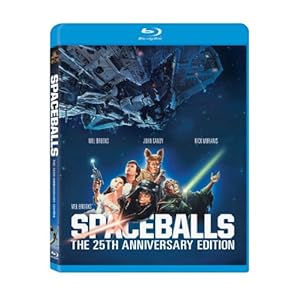

Time has been kind to Spaceballs, Mel Brooks' parody of blockbuster science-fiction films. Though not on a par with Young Frankenstein or Blazing Saddles, Spaceballs has enough sparkling moments to somehow wind up more than the sum of its jokes: while it may not inspire love, it's pretty darn hard not to like it. It's some measure of Brooks' comedic skill that he even seems to raise crotch jokes to a fine art, while lesser filmmakers just come across as gauche with their low blows.
Brooks and co-screenwriters Thomas Meehan and Ronny Graham hew fairly closely to Star Wars and The Empire Strikes Back in their plotting. They efficiently conflate Han Solo and Luke Skywalker into a single hero: Lone Starr (Bill Pullman), captain of the Eagle 5 (a Winnebago with space wings). Like Han Solo, Lone Starr is a mercenary rogue traveling with an alien companion. The Chewbacca-esque Barf (John Candy) is a mawg, a half-man/half-dog who explains, "I'm my my own best friend." King Roland (Dick Van Patten) of Planet Druidia enlists Lone Starr and Barf to rescue his daughter, "Druish" Princess Vespa (Daphne Zuniga) and her roller-skating robot Dot Matrix (physically performed by mime/dancer Lorene Yarnell and voiced by Joan Rivers) from the denizens of Planet Spaceball.
Planet Spaceball, you see, is running out of air, though President Skroob (Brooks) vehemently denies the "rumor" when not huffing cans of "Perri-air" (or flashing his modified "heil" gesture). Skroob has commanded his minion Dark Helmet (Rick Moranis) to kidnap Vespa as ransom to obtain Druidia's air supply. Dark Helmet is the film's most sublime comic creation: a touchy tinpot tyrant wearing an oversized black helmet with a face mask, which he pretends alters his voice to a James Earl Jones-ish bass (costumer Donfeld also supplies a hilarious desert-attire variation on Dark Helmet's costume). Moranis' work here is pure genius, every line reading ("Fooled you!") and bit of body language honed to perfection. Dark Helmet has his own minions, among them straight man Colonel Sandurz (George Wyner) and a Radar Technician (kitschy vocal sound effects man Michael Winslow). Echoing similar proclamations from Get Smart, Dark Helmet claims, "Evil will always triumph because good is dumb."
Brooks turns up in a second guise as the wizened Yogurt, whose knowledge of "the Schwartz" is great and savvy in merchandising is even greater. One of Spaceballs' most charming conceits is persistently to "break the fourth wall" and acknowledge the film is a film ("Nice dissolve," notes Barf). Blazing Saddles pulled the same trick, but there it was a function of zany surrealism only; here, the movie gags packs a satirical punch, particularly in the subversive gags about merchandising, box office and sequel potential being more important than the movie itself. The rest of the gags are mostly verbal and visual puns that tickle even as they elicit groans (combing the desert, for instance, requires the use of giant combs). JM J. Bullock appears as Prince Valium and Dom DeLuise (who else?) provides the voice of space-gangster Pizza the Hutt.
Spaceballs easily deflates the pomp of space operas, already widely parodied by the film's release in 1987. Brooks offers "ludicrous speed," viewscreens everywhere (even above the urinal), and spaceships with bumper stickers. In addition to Star Wars, Brooks and company take potshots at Star Trek, Transformers (as in Howard Korder's 1985 off-Broadway space spoof "Episode 26," there's a kind of "Heavenly Hoover" involved in the climax), Alien, Max Headroom, and The Wizard of Oz. The Wizard-like approach to Yogurt's temple was shot on the very MGM soundstage where the 1939 film was shot, and in an even stranger head trip, many of the technicians who worked on Star Wars also worked on Spaceballs, which had a significant special-effects budget.
Despite the dirty jokes hidden in plain sight ("Never underestimate the power of the Schwartz!"), Spaceballs is a PG-rated comedy that makes silliness sublime. And who could forget "Spaceballs," performed by The Spinners ("Don't mess around with the Spaceballs!/Watch out!")?

|
|
 |
In its 25th Anniversary Edition Blu-ray, Spaceballs looks ludicrously good for a 22-year-old movie. It looks exactly as I remember it looking on the big screen, if not better, given the unreliable nature of film projection. The image is accurate in color and contrast, and detail is excellent. I noticed a touch of telecine wobble during the end credits, but it's only a nitpick of a fine transfer. Equally surprising is a full-bodied DTS-HD Master Audio 5.1 mix that makes strong use of surround channels to give legit space movies a run for their money.
A brand-new bonus feature debuts this time around: "Force Yourself! Spaceballs and the Skroobing of Sci-Fi" (16:43, HD). The featurette mostly gives Mel Brooks a fresh chance to hold court about the film, his memories about it (including trepidatiously interfacing with George Lucas), its enduring popularity, and whatever else (humorously) occurs at the moment; Rudy DeLuca also pops in.
Beyond that, the 25th Anniversary Edition Blu-ray includes all previous Blu-ray features and nearly every previously issued DVD bonus feature. For starters, there's a commentary by Mel Brooks, always amusing and one of Hollywood's top raconteurs, despite his rambling style.
"Spaceballs: The Documentary" (30:04, SD), from 2003, recalls the film's making through interviews with Brooks, Bill Pullman, Dick Van Patten, George Wyner, Daphne Zuniga, visual effects supervisor Peter Donen, Joan Rivers, director of photography Nick McLean, makeup designer Ben Nye, Jr., John Candy (vintage), and Rudy De Luca.
The 2005 featurette "In Conversation: Mel Brooks & Thomas Meehan" (20:30, SD) is a charming chat between the longtime friends and collaborators, who effectively interview each other (though an outtake in the credits reveals that a producer crouched at their side to prompt them as needed, you'd otherwise probably not notice).
"John Candy: Comic Spirit" (10:02, SD), also from 2003, remembers the late star. Interviewees include Zuniga, Van Patten, Pullman, Rivers, Bullock, Wyner, Brooks, Donen, biographer Martin Knelman, Nye, Eugene Levy (vintage), and Candy (1991, 1994). There's also a bit of memorial service footage, including an excerpt of Catherine O'Hara's eulogy.
"Watch the Movie in Ludicrous Speed" (:29, HD) is a pointless fast-forwarded view of the film.
Film Flubs is an interesting idea for a bonus feature (pointing out mistakes from the movie), but it's badly formatted and winds up being a waste of time. They include "Edge of the Mirror" (:16, SD), "Grabs Himself Easily" (:13, SD), "The Magic Reappearing Ring" (:25, SD), "More Than His Head" (:27, SD), "No End in Sight" (:14, SD), and "Tracks Behind Dot" (:19, SD).
You'll also find a "Storyboards-to-Film Comparison" (6:41, SD) montage, Still Gallery, "Exhibitor Trailer with Mel Brooks Introduction" (2:12, SD) and "Theatrical Trailer" (2:30, SD)
[This new edition omits the DVD disc (which contained the feature in standard def and a short behind-the-scenes featurette from the original EPK).]
Previous editions:
 |
|
 |